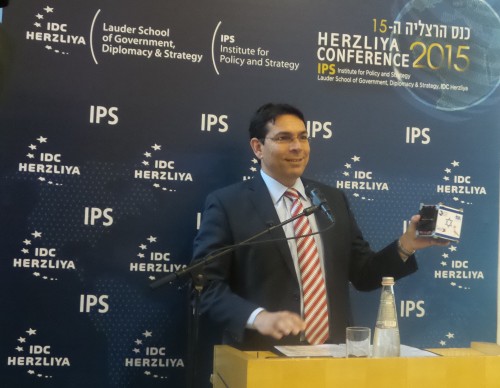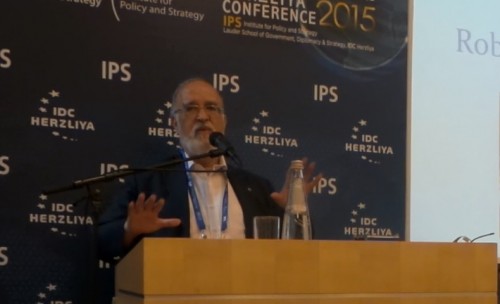The program was revealed for the first time yesterday (Tuesday) at the Herzliya conference. According to the council's proposal, the government program in Israel will work to encourage the construction and development of an Israeli industry that will produce robots and autonomous systems in the context of five key areas: medicine, transportation, welfare and nursing, industrial automation and security, as well as the establishment of a national R&D institute for robotics

A national program in the field of robotics will bring about a fundamental change in the quality of life and the level of services for many Israeli populations and can serve as an engine of economic growth for Israeli industry with sales and export potential of billions of dollars - according to a special report of the National Research and Development Council of the Ministry of Science published today (Tuesday) at the Herzliya conference. Accordingly, the Ministry of Science is currently promoting a plan to establish an applied research institute in the field of robotics.
Haim Russo, Elbit's vice president until recently and a member of the MOLMP who presented the program at the Herzliya conference, says that in the last decade many countries in the world recognize the need for a national program of investments in the field of robotics, and as an example he cited the USA, which invests 50 million dollars per year, a large program of the Union the European for an investment of 2.8 billion dollars in several years. And in Japan, Singapore, Korea and even in China, which until recently was considered a country of cheap labor, they are also looking to optimize work through robotics.
"The field of robotics is perceived differently. In the past it was another technological branch intended for those who have a technical sense. Today, the world of robotics is a world biased towards applications that make it possible to develop a better society and create a competitive industry, and only in third place do they invest because of the business potential."
The Council recommends the formulation of a national program for R&D in the fields of robotics and autonomous systems whose goal is to develop, implement and export products and services based on Israeli robotics technologies. An inspection carried out by the council shows that the business potential of the robotics industry is estimated to be in the hundreds of billions of dollars worldwide. The Japanese forecast estimates that by 2035 the value of the market in Japan will be about 100 billion dollars.
According to the council's proposal, the government program in Israel will act to encourage the construction and development of an Israeli industry that will produce robots and autonomous systems in connection with five key areas: medicine, transportation, welfare and nursing, industrial automation and security. The council also recommends the establishment of a national robotics R&D institute, under which the projects will be grouped, as well as the holding of an annual professional conference with the participation of leading parties from the country and the world.

According to Rousseau, after decades in which robotics was limited to industrial automation, in recent years it has broken out into many and varied areas of application, such as tiny unmanned aircraft, robots to assist in medical surgeries, housekeeping and cleaning, nursing the elderly and assisting the disabled, autonomous vehicles, and more. The change is due to many technologies that have reached maturity and enable new applications or become possible at a reasonable price for the customer, including advanced human-machine interface technologies, machine learning and computerized decision-making, spatial navigation and more.
The Minister of Science, Technology and Space Danny Danon said upon the publication of the Council's conclusions: "Israel needs a national program for robotics that will enable long-term planning to meet social and demographic challenges and preserve its economic resilience. The ministry is currently promoting a plan to establish an applied research institute for robotics and is examining the council's proposal. Robots that will help in the household, babysitters and nursing the elderly and sick, will improve the quality of life of citizens and ease the burden on taxpayers. Government robotics R&D will enable a response to challenges such as the aging of the population and the shrinking of the workforce."
As part of the program, in each of the five fields, students and researchers from the academy will be integrated together with developers from the industry and will include educational activities in the framework of the activity, for school students. Within this framework, jobs will be reserved for returning Israeli scientists and engineers and international research and development teams will be established.

The MoLMOP emphasizes that today the robotics industry and academic activity in this field in Israel operate without government guidance and coordination and there are companies that manufacture robots in the fields of medicine and agriculture and also companies that incorporate robots in some of their products or that develop technologies that can be applied to the production of robots.
Among the government programs for robotics R&D that stand out in the world are: the European Union program that includes a fund worth 2.8 billion euros; A Japanese program from June 2014 in which Japan announced the "robot revolution" as a growth engine for the Japanese economy; South Korea has also invested an amount of about 2.7 billion dollars in the national robotics program, within the framework of the robotics law that was enacted in 2008 and defines a vision for the place of robots in society; Whereas the American initiative allocates an amount of about half a billion dollars to the field of robotics, as part of a larger plan, amounting to 2.5 billion dollars, intended for the development of advanced means of production.
"The unique characteristics of R&D in the field require a multidisciplinary approach that includes a combination of software and hardware, as well as cooperation between many parties in industry and academia," explains the chairman of the National Council for R&D at the Ministry of Science, Prof. Yitzhak Ben-Israel. "These are complex R&D projects characterized by a longer time frame than is customary in the business sector. The national programs for the advancement of robotics deal with the promotion of interdisciplinary initiatives. The formation of a national program on the subject will be an engine of economic growth both through improving the quality of life through robots, through the creation of jobs and through the export of products and services."

One response
Where will the funding come from? How much money are we talking about here? A lot of chatter but nothing specific, we'll invest here and invest there.